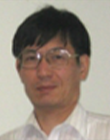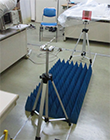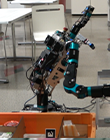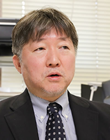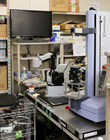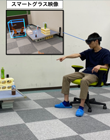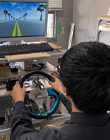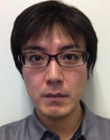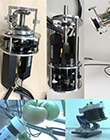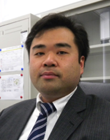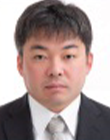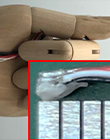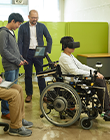Professor
Prof. Masumi Inoue Faculty Information Courses Laboratory Homepage
| Field of Expertise | Electrical Devices, Electronic Equipment, Electronic and Electrical Materials Engineering, Measurement Engineering |
|---|---|
| Graduate School Affiliation | Graduate School of Science and Technology (Master's and Doctoral Programs) |
We are conducting research on wireless power transmission, which transfers electric power without the use of conductive wires by utilizing microwaves or magnetic fields. Our studies explore various applications, including power supply for flying objects, power relay systems for robots operating in disaster areas, and practical implementations in homes, transportation systems, and other environments. In addition, we are investigating energy harvesting, a technology that captures small amounts of unused energy from the surrounding environment and converts it into electricity — in particular, focusing on power generation from radio waves. Furthermore, we conduct simulation-based studies on superconducting devices with microstructures to analyze their operation and establish design guidelines for their performance and optimization.
Prof. Kenichi Ohara Faculty Information Courses Laboratory Homepage
| Field of Expertise | Robotics |
|---|---|
| Graduate School Affiliation | Graduate School of Science and Technology (Master's and Doctoral Programs) |
At Ohara Laboratory (Robot System Design Laboratory), we aim to introduce robots into environments where they can coexist with humans. Our primary focus is on the development of middleware technologies that serve as platforms to accelerate robot system integration. To further advance system integration, we are also engaged in the development of robot hardware with new concepts and vision systems, along with a wide range of research projects that apply these technologies.
Prof. Soichi Saeki Faculty Information Courses
| Field of Expertise | Visualization Information Engineering, Medical Diagnostic Equipment, Microsystems, Measurement Engineering and Signal Processing Engineering |
|---|---|
| Graduate School Affiliation | Graduate School of Science and Technology (Master's and Doctoral Programs) |
In this study, we found that even slight variations—such as the presence of unfavorable materials or structures within about one millimeter beneath the surface of human skin—can cause modulation in the detected signals. From a broader perspective, the same principle applies not only to humans but also to vehicles. Recently, we have received increasing requests from material manufacturers who wish to measure the hardness or softness of materials without any physical contact. Our research therefore extends beyond the field of medical engineering, adopting a multifaceted approach to advance the practical application of tomographic visualization and diagnostic devices across a wide range of disciplines.
Prof. Kosuke Sekiyama Faculty Information Courses
| Field of Expertise | Autonomous Distributed Systems, Intelligent Robotics, Information Processing in Complex Systems |
|---|---|
| Graduate School Affiliation | Graduate School of Science and Technology (Master's and Doctoral Programs) |
Our laboratory possesses core technologies for autonomous robot control based on visual information, including self-localization using Visual SLAM in indoor environments, posture and grasp control of dual-arm mobile manipulators, and autonomous flight control of drones. Building upon these foundational technologies, we aim to develop a cyber-physical system in which humans and robots are seamlessly connected through Mixed Reality (MR) technology. In this system, users can intuitively operate robots through gesture-based interaction, while robots dynamically coordinate with one another to perform complex tasks—realizing an extension of human and robotic embodiment within an integrated virtual and physical environment.
Prof. Jianming Yang Faculty Information Courses
| Field of Expertise | Intelligent Systems Control Engineering, Image and Signal Processing Engineering |
|---|---|
| Graduate School Affiliation | Graduate School of Science and Technology (Master's and Doctoral Programs) |
In our laboratory, we design, develop, and control intelligent systems through control and information processing technologies. Students not only learn the fundamental methods required to realize the intelligence of robots and machines, but also explore new control approaches and system architectures to create more advanced intelligent systems. Our research topics include vehicle dynamics and control, environmental perception for autonomous driving, and information transmission from driving environments to humans. Students independently establish their research objectives, plans, and methods based on their own investigations, and pursue their goals through continuous problem-solving. Through this process, they develop into engineers capable of applying their creativity and technical expertise to real-world system design and manufacturing.
Associate Professor
Assoc. Prof. Satoshi Ashizawa Faculty Information Courses
| Field of Expertise | Robotic Systems, System Architecture |
|---|---|
| Graduate School Affiliation | Graduate School of Science and Technology (Master's and Doctoral Programs) |
There are many areas in which mechatronics technologies can contribute to solving Japan’s societal challenges. For example, in addressing the energy problem, mechatronics can contribute through remarkable improvements in efficiency achieved by optimizing motion and operation. In response to the declining birthrate and aging population, mechatronics can support the development of production systems in which humans and machines work collaboratively, enabling a super-aged society to function effectively with limited labor resources. Our laboratory proposes mechatronic systems that exemplify the feasibility of these concepts, aiming to demonstrate how mechatronics can play a vital role in shaping a sustainable and inclusive society.
Assoc. Prof. Akihiko Ichikawa Faculty Information Courses
| Field of Expertise | Micro Systems |
|---|---|
| Graduate School Affiliation | Graduate School of Science and Technology (Master's and Doctoral Programs) |
Cells and microorganisms possess diverse functions, and it is believed that undiscovered microorganisms and yet-unrevealed cellular mechanisms may hold great potential for humanity. In addition, there exist microscopic particles such as house dust and viruses, which are difficult to prevent due to their invisibility. To address these challenges, our goal is to develop microsystems capable of recognizing and manipulating microscopic objects—anywhere, by anyone, and at any scale. We are currently developing a robotic system that enables manipulation of microscopic objects under observation with a smartphone-based microscope.
Assoc. Prof. Yoshiyuki Hata Faculty Information Courses Laboratory Homepage
| Field of Expertise | Sensor Systems |
|---|---|
| Graduate School Affiliation | Graduate School of Science and Technology (Master's and Doctoral Programs) |
We are conducting research on high-precision MEMS inertial sensors for self-localization of autonomous vehicles, as well as tactile sensors designed for robots that coexist with humans. Our work focuses on proposing and experimentally verifying improved sensor structures and signal processing methods. In addition, we study sensor networks in which these sensors coordinate with each other while dynamically controlling communication volume and sensing accuracy. Our goal is to develop sensor systems capable of providing full-body sensing for robots and detecting human motion states in detail using a wide variety of MEMS sensors.
Assoc. Prof. Junichi Meguro Faculty Information Courses Laboratory Homepage
| Field of Expertise | 移Mobile Sensing, Satellite Positioning, ITS, and Mobile Robots |
|---|---|
| Graduate School Affiliation | Graduate School of Science and Technology (Master's and Doctoral Programs) |
Our laboratory conducts research on sensing technologies related to satellite positioning, intelligent transport systems (ITS), autonomous driving, and mobile robots. In particular, we focus on the development of high-precision localization methods using GPS/GNSS for autonomous driving and technologies for constructing and utilizing high-accuracy 3D point-cloud maps, with the goal of applying these technologies to real-world autonomous driving systems. In addition, we are engaged in research on human perception and sensation using a Virtual Reality (VR) system that incorporates a robotized electric wheelchair. Through this system, we aim to evoke realistic sensations even within limited physical spaces, thereby realizing immersive experiences with minimal discomfort.
Specially Appointed Lecturer
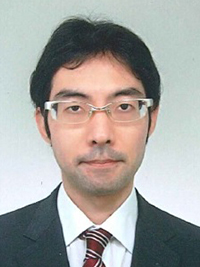
Mr. Takuya Sato Faculty Information Courses
| Field of Expertise | Computational Mechanics |
|---|

